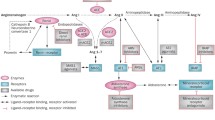Abstract
It is now well-established that inhibition of the angiotensin-converting enzyme (ACE) can retard the progression of chronic renal failure in a variety of experimental and clinical settings. The recent introduction of highly specific angiotensin receptor type 1 (AT1) antagonists has raised the issue whether these compounds produce comparable beneficial effects on the natural progression of chronic renal injury. Currently, a large body of experimental and clinical evidence indicates that both ACE inhibition and AT1 blockade lead to similar changes in renal hemodynamics and proteinuria. Animal studies have also shown that AT1 blockade effectively attenuates the development and progression of renal injury caused by a variety of mechanisms ranging from unilateral ureteric obstruction to renal ablation or immune-mediated acute glomerular injury. These findings make it likely that AT1 blockade may ultimately prove to be a promising new therapy for slowing the progression of renal injury in patients with kidney disease.
Similar content being viewed by others
Author information
Authors and Affiliations
Rights and permissions
About this article
Cite this article
Sharma, A., Maier, T. & Jung, C. Angiotensin II Receptor Blockade and Renal Protection. Basic Res Cardiol 93 (Suppl 2), s120–s124 (1998). https://doi.org/10.1007/s003950050235
Issue Date:
DOI: https://doi.org/10.1007/s003950050235




